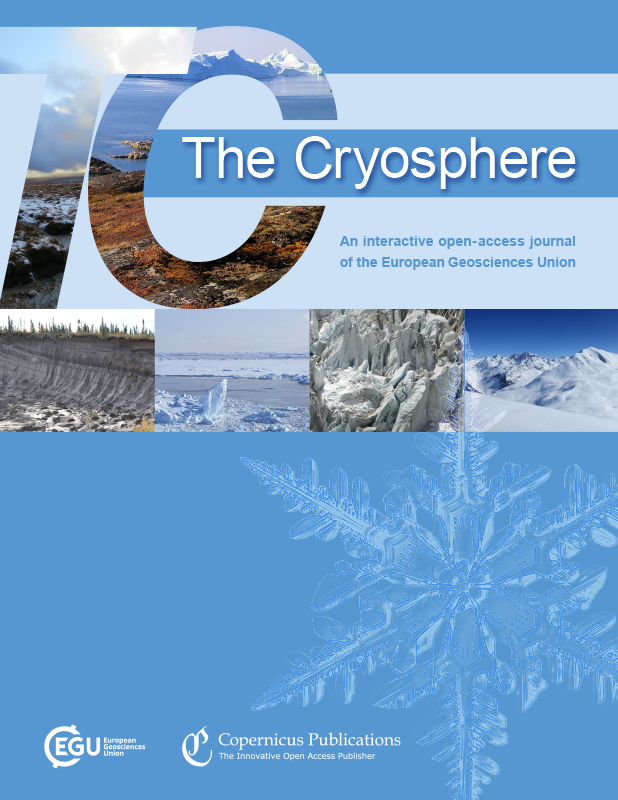Annual evolution of the ice–ocean interaction beneath landfast ice in Prydz Bay, East Antarctica
IF 4.4
2区 地球科学
Q1 GEOGRAPHY, PHYSICAL
引用次数: 0
Abstract
Abstract. High-frequency observations of the ice–ocean interaction and high-precision estimation of the ice–ocean heat exchange are critical to understanding the thermodynamics of the landfast ice mass balance in Antarctica. To investigate the oceanic contribution to the evolution of the landfast ice, an integrated ocean observation system, including an acoustic Doppler velocimeter (ADV), conductivity–temperature–depth (CTD) sensors, and a sea ice mass balance array (SIMBA), was deployed on the landfast ice near the Chinese Zhongshan Station in Prydz Bay, East Antarctica, from April to November 2021. The CTD sensors recorded the ocean temperature and salinity. The ocean temperature experienced a rapid increase in late April, from −1.62 to the maximum of −1.30 ∘C, and then it gradually decreased to −1.75 ∘C in May and remained at this temperature until November. The seawater salinity and density exhibited similar increasing trends during April and May, with mean rates of 0.04 psu d−1 and 0.03 kg m−3 d−1, respectively, which was related to the strong salt rejection caused by freezing of the landfast ice. The ocean current observed by the ADV had mean horizontal and vertical velocities of 9.5 ± 3.9 and 0.2 ± 0.8 cm s−1, respectively. The domain current direction was ESE (120∘)–WSW (240∘), and the domain velocity (79 %) was 5–15 cm s−1. The oceanic heat flux (Fw) estimated using the residual method reached a peak of 41.3 ± 9.8 W m−2 in April, and then it gradually decreased to a stable level of 7.8 ± 2.9 W m−2 from June to October. The Fw values calculated using three different bulk parameterizations exhibited similar trends with different magnitudes due to the uncertainties of the empirical friction velocity. The spectral analysis results suggest that all of the observed ocean variables exhibited a typical half-day period, indicating the strong diurnal influence of the local tidal oscillations. The large-scale sea ice distribution and ocean circulation contributed to the seasonal variations in the ocean variables, revealing the important relationship between the large-scale and local phenomena. The high-frequency and cross-seasonal observations of oceanic variables obtained in this study allow us to deeply investigate their diurnal and seasonal variations and to evaluate their influences on the landfast ice evolution.南极洲东部普里兹湾登陆冰下冰-海洋相互作用的年度演变
摘要冰-海洋相互作用的高频观测和冰-海洋热交换的高精度估计对于理解南极洲登陆冰质量平衡的热力学至关重要。为了研究海洋对陆地冰演化的贡献,2021年4月至11月,在南极洲东部普里兹湾中国中山站附近的陆地冰上部署了一个综合海洋观测系统,包括声学多普勒测速仪(ADV)、电导率-温度-深度(CTD)传感器和海冰质量平衡阵列(SIMBA)。CTD传感器记录了海洋温度和盐度。4月下旬,海洋温度迅速上升,从−1.62升至−1.30的最高值 ∘C、 然后逐渐降低到-1.75 ∘5月气温为摄氏度,一直保持到11月。海水盐度和密度在4月和5月表现出相似的增长趋势,平均增长率为0.04 psu d−1和0.03 公斤 m−3 d−1,这与登陆冰结冰引起的强烈排盐有关。ADV观测到的洋流的平均水平和垂直速度为9.5 ± 3.9和0.2 ± 0.8 厘米 s−1。磁畴电流方向为ESE(120)–WSW(240),磁畴速度(79 %) 为5-15 厘米 s−1.利用残差法估算的海洋热通量达到41.3 ± 9.8 W m−2,然后逐渐下降到7.8的稳定水平 ± 2.9 W m−2从六月到十月。由于经验摩擦速度的不确定性,使用三种不同的体积参数计算的Fw值表现出相似的趋势,但幅度不同。光谱分析结果表明,所有观测到的海洋变量都表现出典型的半天周期,表明局部潮汐振荡的强烈日影响。大尺度海冰分布和海洋环流与海洋变量的季节变化有关,揭示了大尺度现象与局部现象之间的重要关系。本研究中获得的海洋变量的高频和跨季节观测结果使我们能够深入研究它们的日变化和季节变化,并评估它们对登陆冰演化的影响。
本文章由计算机程序翻译,如有差异,请以英文原文为准。
求助全文
约1分钟内获得全文
求助全文
来源期刊

Cryosphere
GEOGRAPHY, PHYSICAL-GEOSCIENCES, MULTIDISCIPLINARY
CiteScore
8.70
自引率
17.30%
发文量
240
审稿时长
4-8 weeks
期刊介绍:
The Cryosphere (TC) is a not-for-profit international scientific journal dedicated to the publication and discussion of research articles, short communications, and review papers on all aspects of frozen water and ground on Earth and on other planetary bodies.
The main subject areas are the following:
ice sheets and glaciers;
planetary ice bodies;
permafrost and seasonally frozen ground;
seasonal snow cover;
sea ice;
river and lake ice;
remote sensing, numerical modelling, in situ and laboratory studies of the above and including studies of the interaction of the cryosphere with the rest of the climate system.
 求助内容:
求助内容: 应助结果提醒方式:
应助结果提醒方式:


